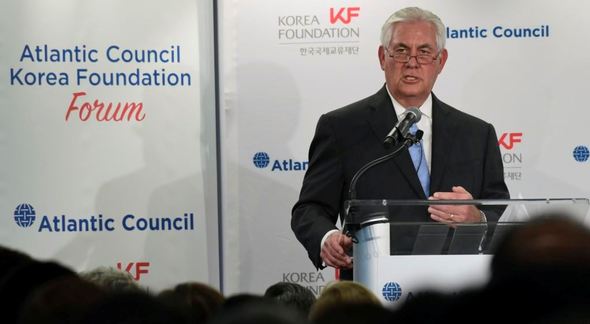Posted on : Dec.14,2017 17:33 KST
Modified on : Dec.14,2017 17:37 KST
 |
|
US Secretary of State Rex Tillerson speaks at a forum sponsored by the Korea Foundation and the Atlantic Council called, “Reimagining the US-Republic of Korea Partnership in the Trans-Pacific Century,” in Washington, D.C. on Dec. 12. (AFP/Yonhap News)
|
US Secretary of State Rex Tillerson said on Dec. 12 that Washington was “ready to have the first meeting [with Pyongyang] without precondition.” This marks a huge change from the US’s past insistence on North Korea’s abandonment of its nuclear program as a precondition for dialogue. He also said it was “not realistic to say we’re only going to talk if you come to the table ready to give up your [nuclear and missile] program.”
Tillerson’s remarks drew a positive response from many foreign news outlets, with the US foreign affairs journal Foreign Policy calling them “one of the clearest diplomatic overtures to date from the Trump administration to Pyongyang.” They are drawing even more attention for coming amid apparent attempts by North Korea to get the ball rolling toward dialogue, including its welcoming UN Under-Secretary-General Jeffrey Feltman for a visit after its Nov. 29 test-launch of the Hwasong-15, an ICBM-level missile capable of reaching the US East Coast, and its declaration of the “completion of state nuclear armament.”
Tillerson’s proposal for a “meeting without preconditions” is extremely sensible. If anything, it is late in coming. So far, Washington has responded to every North Korean nuclear and missile test by raising the threshold for dialogue. It has also said it does not intend to have “dialogue for dialogue’s sake.”
It’s a situation that has only gotten worse since US President Donald Trump took office in January. Domestic political factors have played a large part of this, including souring public opinion in the wake of the nuclear and missile tests. But even “dialogue for dialogue’s sake” is better that leaving the situation to worsen. Meeting is the only way to get the ball rolling even a little bit toward denuclearization. Even if nothing is accomplished, a first meeting could lead to a second meeting. It’s time for a cold appraisal of what has been gained to date from dwelling solely on the “results” of dialogue, rather than an understanding of what the process itself might accomplish.
That’s what makes Tillerson proposal for dialogue without preconditions so meaningful. That said, it is unclear just how much these remarks were discussed beforehand with Trump. In September, Tillerson mentioned the US holding two to three dialogue channels open with North Korea, only to have Trump respond shortly with a tweet dismissing the very idea of dialogue and criticizing him for “wasting his time trying to negotiation with Little Rocket Man [North Korean leader Kim Jong-un].” With Tillerson’s latest remarks, the White House remained vague in its response, saying only that the “President's views on North Korea have not changed.”
The Blue House has been similarly cautious. But Tillerson’s remarks could come up at the South Korea-China summit taking place on Dec. 14. It’s time for Seoul to try a different tack by actively supporting Tillerson’s remarks and nudging Washington toward dialogue. We also strongly urge Pyongyang to respond positively to these overtures.
Please direct questions or comments to [english@hani.co.kr]









